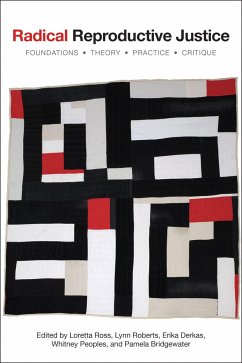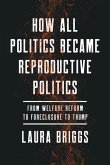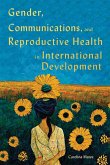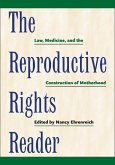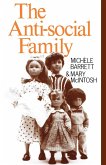Radical Reproductive Justice
Foundation, Theory, Practice, Critique
Herausgeber: Ross, Loretta; Bridgewater Toure, Pamela; Roberts, Lynn; Peoples, Whitney; Derkas, Erika
24,99 €
inkl. MwSt.
Versandfertig in über 4 Wochen

12 °P sammeln
Radical Reproductive Justice
Foundation, Theory, Practice, Critique
Herausgeber: Ross, Loretta; Bridgewater Toure, Pamela; Roberts, Lynn; Peoples, Whitney; Derkas, Erika
- Broschiertes Buch
- Merkliste
- Auf die Merkliste
- Bewerten Bewerten
- Teilen
- Produkt teilen
- Produkterinnerung
- Produkterinnerung
This crucial expansion on social justice discourse surrounding reproductive rights explores the practical applications for activist thought migrating from the community into the academy.
Andere Kunden interessierten sich auch für
![How All Politics Became Reproductive Politics How All Politics Became Reproductive Politics]() Laura BriggsHow All Politics Became Reproductive Politics25,99 €
Laura BriggsHow All Politics Became Reproductive Politics25,99 €![Gender, Communications, and Reproductive Health in International Development Gender, Communications, and Reproductive Health in International Development]() Carolina MatosGender, Communications, and Reproductive Health in International Development39,99 €
Carolina MatosGender, Communications, and Reproductive Health in International Development39,99 €![The Reproductive Rights Reader The Reproductive Rights Reader]() The Reproductive Rights Reader40,99 €
The Reproductive Rights Reader40,99 €![The Anti-Social Family The Anti-Social Family]() Mary McintoshThe Anti-Social Family17,99 €
Mary McintoshThe Anti-Social Family17,99 €![Testo Junkie Testo Junkie]() Paul B PreciadoTesto Junkie20,99 €
Paul B PreciadoTesto Junkie20,99 €![The Crunk Feminist Collection The Crunk Feminist Collection]() The Crunk Feminist Collection20,99 €
The Crunk Feminist Collection20,99 €![Nonbinary Nonbinary]() Nonbinary25,99 €
Nonbinary25,99 €-
-
-
This crucial expansion on social justice discourse surrounding reproductive rights explores the practical applications for activist thought migrating from the community into the academy.
Hinweis: Dieser Artikel kann nur an eine deutsche Lieferadresse ausgeliefert werden.
Hinweis: Dieser Artikel kann nur an eine deutsche Lieferadresse ausgeliefert werden.
Produktdetails
- Produktdetails
- Verlag: Feminist Press
- Seitenzahl: 456
- Erscheinungstermin: 14. November 2017
- Englisch
- Abmessung: 231mm x 157mm x 35mm
- Gewicht: 555g
- ISBN-13: 9781558614376
- ISBN-10: 1558614370
- Artikelnr.: 47745565
- Herstellerkennzeichnung
- Libri GmbH
- Europaallee 1
- 36244 Bad Hersfeld
- gpsr@libri.de
- Verlag: Feminist Press
- Seitenzahl: 456
- Erscheinungstermin: 14. November 2017
- Englisch
- Abmessung: 231mm x 157mm x 35mm
- Gewicht: 555g
- ISBN-13: 9781558614376
- ISBN-10: 1558614370
- Artikelnr.: 47745565
- Herstellerkennzeichnung
- Libri GmbH
- Europaallee 1
- 36244 Bad Hersfeld
- gpsr@libri.de
Human and women's rights activist Loretta Ross co-founded and served as National Coordinator of the SisterSong Women of Color Reproductive Justice Collective, a network that organizes women of color in the reproductive justice movement. In fact, Ross is one of the creators of the term "Reproductive Justice," which envelops human rights and social justice into one movement. In 2004, Ross served as National Co-Director of the March for Women’s Lives in Washington DC. It became the largest protest march in US history with more than one million participants. Ross is the co-author of Undivided Rights: Women of Color Organize for Reproductive Justice and author of The Color of Choice” chapter in Incite! Women of Color Against Violence published in 2006. She has also written extensively on the history of African American women and reproductive justice activism. Lynn Roberts has a BS in human development from Howard University and a PhD in Human Services Studies from Cornell University. The City University of New York has been her academic home since 1995, and she is currently assistant professor in the department of Community Health and Social Sciences at the Graduate School of Public Health & Health Policy. Prior to joining CUNY, she oversaw the development, implementation and evaluation of several prevention programs for women and youth in NYC. She has also served on the board of SisterSong Women of Color Reproductive Justice Collective. Her current activism and scholarship examine the intersections of race, class and gender in adolescent dating relationships, juvenile justice and reproductive health policies; as well as the impact of models of collaborative inquiry and teaching on civic and political engagement. Erika Derkas is a professor of Sociology and Women’s Studies at New Mexico Highlands University and is an active researcher in the area of reproductive justice, particularly, international sex worker organizing, population control, and sterilization abuse among poor women and women of color. She is currently the co-director of the Women’s Studies program and the Women’s Center at Highlands University and has been involved in feminist organizing for numerous years. Her research has taken her from New Zealand to study organizing efforts to decriminalize sex work to Palestine where she is exploring ethnic identity formation among youth, African Palestinians, and women in higher education. Whitney Peoples is currently visiting assistant professor in the department of Multicultural Women’s and Gender Studies at Texas Woman’s University. She received her BA from Agnes Scott College, her MA from the University of Cincinnati, and her PhD from Emory University in Women’s, Gender & Sexuality Studies. Her work has been published in books such as What’s the Big Idea? Feminist Perspectives on Advertising (Lexington Books 2017); A History of African American Autobiography (Cambridge University Press 2017); and Womanist and Black Feminist Responses to Tyler Perry’s Productions (Palgrave MacMillan 2014). She has also published articles in the Journal of College Science Teaching and Meridians. Pamela Bridgewater was an activist lawyer and legal scholar specializing in issues related to reproduction, sexuality, identity, poverty and women's health. She received her JD from Florida State University, and participated in the US Supreme Court case Judy Madsen et al. v. Women's Health Center Inc. Aware Woman Center for Choice, Inc. She went on to obtain an LL.M from the University of Wisconsin Law School, and while in Wisconsin, she developed a lifelong scholarly interest in the relationship between reproductive freedom and black emancipation. As a lawyer, Pamela provided legal defense of reproductive health care clinics, service providers and activists, and also provided pro bono legal service and consultation on matters such as estate planning for poor people and people living with HIV/AIDS, as well as legal services for peace activists and activists within the fair trade and globalization movements. She taught as professor at Northeastern University’s School of Law and at American University's Washington College of Law. She passed away in 2014.
INTRODUCTION
Overview of Reproductive Justice
Origin and Definition of Reproductive Justice
Impact of Reproductive Justice
HISTORICAL CONTEXT
Toni Bond Leonard/Loretta Ross, Laying the Foundation for the Reproductive
Justice Movement
Kalpana Krishnamurthy/Rachael Strickler, An RJ Timeline: Handouts and/or
Pull-out chart
Rachael Strickler/Monica Simpson, A SisterSong History (Herstory)
Lynn Roberts, On Becoming a Mother in Four Movements: An Intergenerational
View through a Reproductive Justice Lens
Stephanie Sellers, Iroquoian Women and Reproductive Justice: Historic
Empowerment
Judy A. M. Scully, Eugenics, Women of Color and Reproductive Health: The
Saga Continues
Deleso Alford Washington, Framing Her-story: Black Women and the
Development of the Medical Specialty of Gynecology in the United States
THEORY
Marlene Gerber Fried, 10 Reasons to Rethink Reproductive "Choice"
Loretta Ross, Conceptualizing Reproductive Justice Theory: A Manifesto for
Activism
Andrea Smith, Beyond Pro-Choice Versus Pro-Life: Women of Color and
Reproductive Justice
Rickie Solinger, Picturing Reproductive Justice: The "Beggars and Choosers"
Exhibition Challenges the Welfare Queen and other 20th Century Ideas about
Maternal Legitimacy and Illegitimacy
Beverly Juan Thompson, "Centering" Reproductive Justice: Transitioning from
Abortion Rights to Social Justice
Erika Derkas/Rachael Strickler, "Retrofitting Choice: White Women and
Reproductive Justice
POLICY, PRACTICE & ACTIVISM
Jill Adams, Reproductive Justice Revolution for Law Students
Pamela Bridgewater - Transforming Silence: The Personal, Political and
Pedagogical Prism of
Abortion Narrative
Erika Derkas - Embracing Sex Work's Complexity: The Anatomy of Global
Organizing
Dazon Dixon Diallo, HIV Prevention and Reproductive Justice: A Framework
for Saving Women's Lives
Melissa L. Gilliam, Amy Neustadt, and Rivka Gordon, Reproductive Justice
and Clinical Practice
Julie Grigsby, We Were All Slaves Once: Post-Traumatic Slave Syndrome and
Reproductive Justice Organizing in Los Angeles
La'Tasha Mayes, Our Civic Engagement Agenda for Reproductive Justice
Benita Miller, Mothering While Poor: Utilizing the Reproductive Justice
Framework to Build the Capacities of Young Mothers
Anna Ochoa O'Leary/William Paul Simmons, Reproductive Justice and
Resistance at U.S.-Mexico Borderlands
Joshua Price, Incarceration and Natal Alienation
Diana Romero and Angenor Medina, The Welfare Family Cap: Reproductive
Rights, Control and Poverty Prevention
Loretta Ross: Trust Black Women: Eugenics Through Billboards
Rachel Roth, "She Doesn't Deserve to be Treated Like This": Reproductive
Injustice in the U.S. Prison System
Seema Sandamana, Mandating Gardasil for Young Girls in the D.C. Public
School System
Judith A.M. Scully, Quinacrine Sterilizations: The "Choice" that Isn't
Alice Skenadore/Erika Derkas, Wise Women's Gathering Place:
Indigenous/Abstinence Model of Teen Pregnancy Prevention
FRESH VOICES, NEW DIRECTIONS
Jamarah Amani, Birth Justice: These Are Our Rights as Mothers
Sophia Arrendondo, Jessica Far, Irene Lara, & Enrique Rodriguez - Entering
Panocha~ A Borderlands Passageway
Mary Krane Derr, Card-Carrying Marchers and Sister Travelers: Pro-life
Feminists and the Reproductive Justice Movement (deceased)
Lucia Leandro Gimeno, The Reluctant RJ Organizers: Trans Issues and
Reproductive Justice
Dheeshana S. Jayasundara, Reproductive Rights or Reproductive Justice for
Reproductive Well-being
Sujatha Jesudason and Emily Galpern, Fresh Voices, Different Perspectives:
Ensuring Just Uses of Human Genetic Technologies
Laura Jimenez, Kierra Johnson and Cara Page, Beyond the Trees: Stories and
Strategies of Environmental and Reproductive Justice
Katie O'Connell, Disability Rights and Reproductive Justice
Cara Page, Lisa Lusero and Mia Mingus, Love Letters to the Queer Liberation
and Reproductive Justice Movement(s)
Amanda Persad, Mothers and Martyrs: Mothers and Sacrifice
Jeanine Kamilah Valrie, Punishment in Reproductive Autonomy: U.S. Drug
Policies and their Effects on Black Women
Aaronette White, Childless by Choice: Tubes Tied Truly Child-Free At Last!
Overview of Reproductive Justice
Origin and Definition of Reproductive Justice
Impact of Reproductive Justice
HISTORICAL CONTEXT
Toni Bond Leonard/Loretta Ross, Laying the Foundation for the Reproductive
Justice Movement
Kalpana Krishnamurthy/Rachael Strickler, An RJ Timeline: Handouts and/or
Pull-out chart
Rachael Strickler/Monica Simpson, A SisterSong History (Herstory)
Lynn Roberts, On Becoming a Mother in Four Movements: An Intergenerational
View through a Reproductive Justice Lens
Stephanie Sellers, Iroquoian Women and Reproductive Justice: Historic
Empowerment
Judy A. M. Scully, Eugenics, Women of Color and Reproductive Health: The
Saga Continues
Deleso Alford Washington, Framing Her-story: Black Women and the
Development of the Medical Specialty of Gynecology in the United States
THEORY
Marlene Gerber Fried, 10 Reasons to Rethink Reproductive "Choice"
Loretta Ross, Conceptualizing Reproductive Justice Theory: A Manifesto for
Activism
Andrea Smith, Beyond Pro-Choice Versus Pro-Life: Women of Color and
Reproductive Justice
Rickie Solinger, Picturing Reproductive Justice: The "Beggars and Choosers"
Exhibition Challenges the Welfare Queen and other 20th Century Ideas about
Maternal Legitimacy and Illegitimacy
Beverly Juan Thompson, "Centering" Reproductive Justice: Transitioning from
Abortion Rights to Social Justice
Erika Derkas/Rachael Strickler, "Retrofitting Choice: White Women and
Reproductive Justice
POLICY, PRACTICE & ACTIVISM
Jill Adams, Reproductive Justice Revolution for Law Students
Pamela Bridgewater - Transforming Silence: The Personal, Political and
Pedagogical Prism of
Abortion Narrative
Erika Derkas - Embracing Sex Work's Complexity: The Anatomy of Global
Organizing
Dazon Dixon Diallo, HIV Prevention and Reproductive Justice: A Framework
for Saving Women's Lives
Melissa L. Gilliam, Amy Neustadt, and Rivka Gordon, Reproductive Justice
and Clinical Practice
Julie Grigsby, We Were All Slaves Once: Post-Traumatic Slave Syndrome and
Reproductive Justice Organizing in Los Angeles
La'Tasha Mayes, Our Civic Engagement Agenda for Reproductive Justice
Benita Miller, Mothering While Poor: Utilizing the Reproductive Justice
Framework to Build the Capacities of Young Mothers
Anna Ochoa O'Leary/William Paul Simmons, Reproductive Justice and
Resistance at U.S.-Mexico Borderlands
Joshua Price, Incarceration and Natal Alienation
Diana Romero and Angenor Medina, The Welfare Family Cap: Reproductive
Rights, Control and Poverty Prevention
Loretta Ross: Trust Black Women: Eugenics Through Billboards
Rachel Roth, "She Doesn't Deserve to be Treated Like This": Reproductive
Injustice in the U.S. Prison System
Seema Sandamana, Mandating Gardasil for Young Girls in the D.C. Public
School System
Judith A.M. Scully, Quinacrine Sterilizations: The "Choice" that Isn't
Alice Skenadore/Erika Derkas, Wise Women's Gathering Place:
Indigenous/Abstinence Model of Teen Pregnancy Prevention
FRESH VOICES, NEW DIRECTIONS
Jamarah Amani, Birth Justice: These Are Our Rights as Mothers
Sophia Arrendondo, Jessica Far, Irene Lara, & Enrique Rodriguez - Entering
Panocha~ A Borderlands Passageway
Mary Krane Derr, Card-Carrying Marchers and Sister Travelers: Pro-life
Feminists and the Reproductive Justice Movement (deceased)
Lucia Leandro Gimeno, The Reluctant RJ Organizers: Trans Issues and
Reproductive Justice
Dheeshana S. Jayasundara, Reproductive Rights or Reproductive Justice for
Reproductive Well-being
Sujatha Jesudason and Emily Galpern, Fresh Voices, Different Perspectives:
Ensuring Just Uses of Human Genetic Technologies
Laura Jimenez, Kierra Johnson and Cara Page, Beyond the Trees: Stories and
Strategies of Environmental and Reproductive Justice
Katie O'Connell, Disability Rights and Reproductive Justice
Cara Page, Lisa Lusero and Mia Mingus, Love Letters to the Queer Liberation
and Reproductive Justice Movement(s)
Amanda Persad, Mothers and Martyrs: Mothers and Sacrifice
Jeanine Kamilah Valrie, Punishment in Reproductive Autonomy: U.S. Drug
Policies and their Effects on Black Women
Aaronette White, Childless by Choice: Tubes Tied Truly Child-Free At Last!
INTRODUCTION
Overview of Reproductive Justice
Origin and Definition of Reproductive Justice
Impact of Reproductive Justice
HISTORICAL CONTEXT
Toni Bond Leonard/Loretta Ross, Laying the Foundation for the Reproductive
Justice Movement
Kalpana Krishnamurthy/Rachael Strickler, An RJ Timeline: Handouts and/or
Pull-out chart
Rachael Strickler/Monica Simpson, A SisterSong History (Herstory)
Lynn Roberts, On Becoming a Mother in Four Movements: An Intergenerational
View through a Reproductive Justice Lens
Stephanie Sellers, Iroquoian Women and Reproductive Justice: Historic
Empowerment
Judy A. M. Scully, Eugenics, Women of Color and Reproductive Health: The
Saga Continues
Deleso Alford Washington, Framing Her-story: Black Women and the
Development of the Medical Specialty of Gynecology in the United States
THEORY
Marlene Gerber Fried, 10 Reasons to Rethink Reproductive "Choice"
Loretta Ross, Conceptualizing Reproductive Justice Theory: A Manifesto for
Activism
Andrea Smith, Beyond Pro-Choice Versus Pro-Life: Women of Color and
Reproductive Justice
Rickie Solinger, Picturing Reproductive Justice: The "Beggars and Choosers"
Exhibition Challenges the Welfare Queen and other 20th Century Ideas about
Maternal Legitimacy and Illegitimacy
Beverly Juan Thompson, "Centering" Reproductive Justice: Transitioning from
Abortion Rights to Social Justice
Erika Derkas/Rachael Strickler, "Retrofitting Choice: White Women and
Reproductive Justice
POLICY, PRACTICE & ACTIVISM
Jill Adams, Reproductive Justice Revolution for Law Students
Pamela Bridgewater - Transforming Silence: The Personal, Political and
Pedagogical Prism of
Abortion Narrative
Erika Derkas - Embracing Sex Work's Complexity: The Anatomy of Global
Organizing
Dazon Dixon Diallo, HIV Prevention and Reproductive Justice: A Framework
for Saving Women's Lives
Melissa L. Gilliam, Amy Neustadt, and Rivka Gordon, Reproductive Justice
and Clinical Practice
Julie Grigsby, We Were All Slaves Once: Post-Traumatic Slave Syndrome and
Reproductive Justice Organizing in Los Angeles
La'Tasha Mayes, Our Civic Engagement Agenda for Reproductive Justice
Benita Miller, Mothering While Poor: Utilizing the Reproductive Justice
Framework to Build the Capacities of Young Mothers
Anna Ochoa O'Leary/William Paul Simmons, Reproductive Justice and
Resistance at U.S.-Mexico Borderlands
Joshua Price, Incarceration and Natal Alienation
Diana Romero and Angenor Medina, The Welfare Family Cap: Reproductive
Rights, Control and Poverty Prevention
Loretta Ross: Trust Black Women: Eugenics Through Billboards
Rachel Roth, "She Doesn't Deserve to be Treated Like This": Reproductive
Injustice in the U.S. Prison System
Seema Sandamana, Mandating Gardasil for Young Girls in the D.C. Public
School System
Judith A.M. Scully, Quinacrine Sterilizations: The "Choice" that Isn't
Alice Skenadore/Erika Derkas, Wise Women's Gathering Place:
Indigenous/Abstinence Model of Teen Pregnancy Prevention
FRESH VOICES, NEW DIRECTIONS
Jamarah Amani, Birth Justice: These Are Our Rights as Mothers
Sophia Arrendondo, Jessica Far, Irene Lara, & Enrique Rodriguez - Entering
Panocha~ A Borderlands Passageway
Mary Krane Derr, Card-Carrying Marchers and Sister Travelers: Pro-life
Feminists and the Reproductive Justice Movement (deceased)
Lucia Leandro Gimeno, The Reluctant RJ Organizers: Trans Issues and
Reproductive Justice
Dheeshana S. Jayasundara, Reproductive Rights or Reproductive Justice for
Reproductive Well-being
Sujatha Jesudason and Emily Galpern, Fresh Voices, Different Perspectives:
Ensuring Just Uses of Human Genetic Technologies
Laura Jimenez, Kierra Johnson and Cara Page, Beyond the Trees: Stories and
Strategies of Environmental and Reproductive Justice
Katie O'Connell, Disability Rights and Reproductive Justice
Cara Page, Lisa Lusero and Mia Mingus, Love Letters to the Queer Liberation
and Reproductive Justice Movement(s)
Amanda Persad, Mothers and Martyrs: Mothers and Sacrifice
Jeanine Kamilah Valrie, Punishment in Reproductive Autonomy: U.S. Drug
Policies and their Effects on Black Women
Aaronette White, Childless by Choice: Tubes Tied Truly Child-Free At Last!
Overview of Reproductive Justice
Origin and Definition of Reproductive Justice
Impact of Reproductive Justice
HISTORICAL CONTEXT
Toni Bond Leonard/Loretta Ross, Laying the Foundation for the Reproductive
Justice Movement
Kalpana Krishnamurthy/Rachael Strickler, An RJ Timeline: Handouts and/or
Pull-out chart
Rachael Strickler/Monica Simpson, A SisterSong History (Herstory)
Lynn Roberts, On Becoming a Mother in Four Movements: An Intergenerational
View through a Reproductive Justice Lens
Stephanie Sellers, Iroquoian Women and Reproductive Justice: Historic
Empowerment
Judy A. M. Scully, Eugenics, Women of Color and Reproductive Health: The
Saga Continues
Deleso Alford Washington, Framing Her-story: Black Women and the
Development of the Medical Specialty of Gynecology in the United States
THEORY
Marlene Gerber Fried, 10 Reasons to Rethink Reproductive "Choice"
Loretta Ross, Conceptualizing Reproductive Justice Theory: A Manifesto for
Activism
Andrea Smith, Beyond Pro-Choice Versus Pro-Life: Women of Color and
Reproductive Justice
Rickie Solinger, Picturing Reproductive Justice: The "Beggars and Choosers"
Exhibition Challenges the Welfare Queen and other 20th Century Ideas about
Maternal Legitimacy and Illegitimacy
Beverly Juan Thompson, "Centering" Reproductive Justice: Transitioning from
Abortion Rights to Social Justice
Erika Derkas/Rachael Strickler, "Retrofitting Choice: White Women and
Reproductive Justice
POLICY, PRACTICE & ACTIVISM
Jill Adams, Reproductive Justice Revolution for Law Students
Pamela Bridgewater - Transforming Silence: The Personal, Political and
Pedagogical Prism of
Abortion Narrative
Erika Derkas - Embracing Sex Work's Complexity: The Anatomy of Global
Organizing
Dazon Dixon Diallo, HIV Prevention and Reproductive Justice: A Framework
for Saving Women's Lives
Melissa L. Gilliam, Amy Neustadt, and Rivka Gordon, Reproductive Justice
and Clinical Practice
Julie Grigsby, We Were All Slaves Once: Post-Traumatic Slave Syndrome and
Reproductive Justice Organizing in Los Angeles
La'Tasha Mayes, Our Civic Engagement Agenda for Reproductive Justice
Benita Miller, Mothering While Poor: Utilizing the Reproductive Justice
Framework to Build the Capacities of Young Mothers
Anna Ochoa O'Leary/William Paul Simmons, Reproductive Justice and
Resistance at U.S.-Mexico Borderlands
Joshua Price, Incarceration and Natal Alienation
Diana Romero and Angenor Medina, The Welfare Family Cap: Reproductive
Rights, Control and Poverty Prevention
Loretta Ross: Trust Black Women: Eugenics Through Billboards
Rachel Roth, "She Doesn't Deserve to be Treated Like This": Reproductive
Injustice in the U.S. Prison System
Seema Sandamana, Mandating Gardasil for Young Girls in the D.C. Public
School System
Judith A.M. Scully, Quinacrine Sterilizations: The "Choice" that Isn't
Alice Skenadore/Erika Derkas, Wise Women's Gathering Place:
Indigenous/Abstinence Model of Teen Pregnancy Prevention
FRESH VOICES, NEW DIRECTIONS
Jamarah Amani, Birth Justice: These Are Our Rights as Mothers
Sophia Arrendondo, Jessica Far, Irene Lara, & Enrique Rodriguez - Entering
Panocha~ A Borderlands Passageway
Mary Krane Derr, Card-Carrying Marchers and Sister Travelers: Pro-life
Feminists and the Reproductive Justice Movement (deceased)
Lucia Leandro Gimeno, The Reluctant RJ Organizers: Trans Issues and
Reproductive Justice
Dheeshana S. Jayasundara, Reproductive Rights or Reproductive Justice for
Reproductive Well-being
Sujatha Jesudason and Emily Galpern, Fresh Voices, Different Perspectives:
Ensuring Just Uses of Human Genetic Technologies
Laura Jimenez, Kierra Johnson and Cara Page, Beyond the Trees: Stories and
Strategies of Environmental and Reproductive Justice
Katie O'Connell, Disability Rights and Reproductive Justice
Cara Page, Lisa Lusero and Mia Mingus, Love Letters to the Queer Liberation
and Reproductive Justice Movement(s)
Amanda Persad, Mothers and Martyrs: Mothers and Sacrifice
Jeanine Kamilah Valrie, Punishment in Reproductive Autonomy: U.S. Drug
Policies and their Effects on Black Women
Aaronette White, Childless by Choice: Tubes Tied Truly Child-Free At Last!
